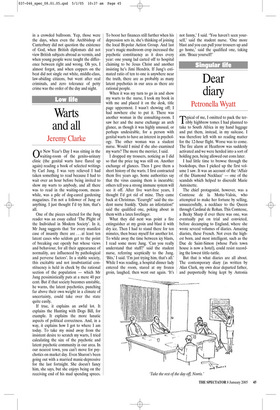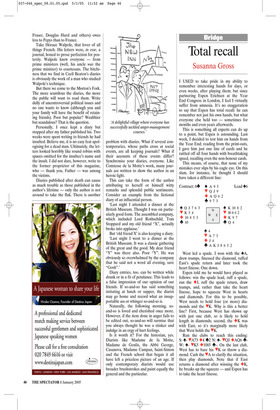Dear diary
Petronella Wyatt
Typical of me, I omitted to pack the terribly highbrow tomes I had planned to take to South Africa in my hand luggage and put them, instead, in my suitcase. I was therefore left with no reading matter for the 12-hour flight. Worse was to come. The fire alarm at Heathrow was suddenly activated and we were herded into a sort of holding pen, being allowed out eons later.
I had little time to browse through the bookshops, thus I picked up the first volume I saw. It was an account of the ‘Affair of the Diamond Necklace’ — one of the scandals which helped to discredit Marie Antoinette.
The chief protagonist, however, was a Comtesse de la Motte-Valois, who attempted to make her fortune by selling, unsuccessfully, a necklace to the Queen through Cardinal de Rohan. This Comtesse, a Becky Sharp if ever there was one, was eventually put on trial and convicted, before decamping to England, where she wrote several volumes of diaries. Amazing diarists, these French. Not even the highest born, and most intelligent, such as the Duc de Saint-Simon (whose Paris town house is now a hotel), could resist recording the lowest tittle-tattle.
But that is what diaries are all about. The contemporary diary (as written by Alan Clark, my own dear departed father, and purportedly being kept by Antonia Fraser, Douglas Hurd and others) owes less to Pepys than to France.
Take Horace Walpole, that lover of all things French. His letters were, in esse, a journal, honed to prose perfection for posterity. Walpole knew everyone — from prime ministers (well, his uncle was the prime minister) to courtesans. The bitchiness that we find in Cecil Beaton’s diaries is obviously the work of a man who studied Walpole’s technique.
But there we come to the Morton’s Fork. The more scurrilous the diaries, the more the public will want to read them. Write dully of uncontroversial political issues and no one wants to know (although you and your family will have the benefit of retaining friends). Poor but popular? Wealthier but scandalous? That is the question.
Personally, I once kept a diary but stopped after my father published his. Two weeks were spent writing to friends he had insulted. Believe me, it is no easy feat apologising for a dead man. Ultimately, the letters looked horribly like round robins with spaces omitted for the insultee’s name and the insult. I did not dare, however, write to the former proprietor of this magazine, who — thank you, Father — was among the victims.
Diaries published after death can cause as much trouble as those published in the author’s lifetime — only the author is not around to take the flak. There is another problem with diaries. What if several contemporaries, whose paths cross at social events, are all keeping journals? What if their accounts of these events differ? Synchronise your diaries, everyone. Like Comtesse de la Motte’s work, many journals are written to show the author in an heroic light.
This can take the form of the author attributing to herself or himself witty remarks and splendid public sentiments. Consider an example from the fictional diary of an influential person.
‘Last night I attended a dinner at the British Museum. Thought I was on particularly good form. The assembled company, which included Lord Rothschild, Tom Stoppard and my old friend “X”, actually broke into applause.’ But ‘old friend X’ is also keeping a diary.
‘Last night I went to a dinner at the British Museum. It was a classic gathering of the great and the good. My dear friend “Y” was there also. Poor “Y”. He was obviously so overwhelmed by the company that he said not a word all evening, save “Gosh”.’ Diary entries, too, can be written while drunk or in a fit of petulance. This leads to a false impression of our opinion of our friends. If so-and-so has said something irritating at lunch or supper, the diarist may go home and record what an insupportable ass or whinger so-and-so is.
Naturally, the following morning, soand-so is loved and cherished once more. However, if the item done in anger fails to be edited out, so-and-so will surmise that you always thought he was a stinker and indulge in an orgy of hurt feelings.
Is it worth it? For the historian, yes. Diarists like Madame de la Motte, Madame de Genlis, the Abbé George, Casanova, Madame Campan, Saint-Simon and the French school that began it all have left a priceless picture of an age. If only contemporary diarists would use broader brushstrokes and paint equally the general and the particular.











































 Previous page
Previous page